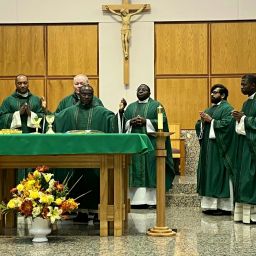
By Father Jacob Dankasa
Special to The Texas Catholic
The last words of a beloved one are very important. In a family with an older patriarch or matriarch who is in the final stages of life, the family often stands around him or her during the transition from this world. The family often hangs on to the last words of their father or mother at the point of death, since these last words spoken by a parent are often very important, and many value these words for the rest of their lives. Some consider such words as the last wishes of their father or mother.
The scene of the Ascension of Our Lord Jesus Christ was the last time that Jesus spoke publicly and in person to his disciples before he ascended into heaven. The words spoken to them could be termed as his last words or wishes for his disciples, and those words were very important and memorable for them:
“He said to them, “These are my words that I spoke to you while I was still with you, that everything written about me in the law of Moses and in the prophets and psalms must be fulfilled.” Then he opened their minds to understand the scriptures. And he said to them, “Thus it is written that the Messiah would suffer and rise from the dead on the third day and that repentance, for the forgiveness of sins, would be preached in his name to all the nations, beginning from Jerusalem. You are witnesses of these things.” (Luke 24:44-48)
These last words of Jesus to his disciples were very important parting words for them, and they took them to heart. Particularly, Jesus reminded them that they were the recipients of the word of God as he “opened their minds to understand the scriptures,” and that through them the suffering and resurrection of the Messiah “would be preached in his name to all nations.” He then gave them the most important reminder of all: “You are witnesses of these things.” These were his last words, and they set the disciples on fire with the instruction and commission to go forth and be to the world what they had witnessed. “You are Witnesses.” Jesus’ last wish at the scene of the Ascension is for the disciples to be “witnesses” to the world of what they saw and heard from him.
The disciples lived by these words of Jesus; they followed his instructions and became his witnesses. We have the gospel today because of the witness of these disciples, who became such devoted witnesses that some of them even gave up their lives for it.
Today we as Christians have also been called and set apart to be witnesses of Jesus, to continue the work of the disciples. We must be authentic and true witnesses of Jesus to our world today. How do we witness effectively?
In the ordinary sense of the word, a witness is one who stands to speak or testify on behalf of someone or something. If we have a case in a court of law and we need to present a witness who can speak on our behalf, we look for someone who we believe will offer good testimony on our behalf, to help us win the case. But imagine a scenario in which you bring in a star witness to stand for you, to testify on your behalf, but during the trial that star witness turns against you and testifies against you. Or perhaps he testifies so poorly that it makes him or her unbelievable. That will not help your case. What this means is that we could have a good or a bad witness. When it comes to our faith, are we good or bad witnesses for Jesus?
For us who are called to be witnesses for Jesus, our words and our ways of life can witness for or against him. To be true and authentic witnesses we must strive to learn how to witness effectively — we must read and understand the scriptures, we must understand and believe the teachings of the Church, and we must live our lives as examples of and testimony to the living presence of Christ on earth. As the saying goes, “You can’t give what you don’t have.” If we do not read and understand the scriptures, if we do not live by the teachings of the faith, we can’t witness to Christ effectively. Witnessing effectively changes someone else through the example of our lives in both word and deed.
Pope Paul VI remarked in “Evangelii Nuntiandi” (#41), that “Modern man listens more willingly to witnesses than to teachers, and if he does listen to teachers, it is because they are witnesses.” Our ultimate call as Christians is to live, teach and bring people to Christ through the example of our witness. For us to be effective teachers of the word of God we must be witnesses first. We cannot convert souls merely by telling or teaching them about Jesus or about our faith — we must witness to that faith in the way we live.
As a priest, I’m a teacher of the faith. I preach the word of God always and I tell people about Jesus. These are beautiful acts of evangelization. But if I’m unable or unwilling to visit the sick in my parish, if I do not care about the poor and the needy of my church, if I do not become present to the community I serve, if I’m not compassionate about the worries and troubles of my parishioners, then I’m only a teacher of the faith and not a witness who can effectively touch people’s lives. As Pope Paul VI said, people listen more to witnesses than to teachers.
Similarly, as a parent you can be the best adviser to your children. You can tell them never to use vulgar words, you can tell them that it’s good to show love to others, you can tell them about all the good things they should do in life. This is good teaching. But if your children constantly hear you use curse words or they see you treat your spouse spitefully and with disrespect, then your teaching will not be effective — you’re only being a teacher and not a witness. If your children are to listen to you as a teacher, you must be a witness first — you must be an example to them.
In the world of social media and the Internet, where many people argue and debate about which faith, religion or church is the best, we must be careful not to come across as teachers who lack the witnessing component of our lessons. If, in the process of trying to defend my faith or trying to teach someone about my faith, I enter into tumultuous arguments that are embedded with derogatory and disrespectful words that are not Christlike, then I become a teacher — and not a very effective one — who is failing to witness. It’s easy to fall into such a trap in the emotionally charged world of social media. But such words and actions will never inspire anyone who doesn’t know Jesus to want to know him. In other words, we’ll be like the star witness invited by a defendant to a court of law to testify on his behalf, but who ended up testifying so badly that no one believed him.
Father Jacob Dankasa is the pastoral administrator of Holy Family of Nazareth Catholic Church in Irving.















